CARACAS, Venezuela – With the arrival of Hugo Chávez and his Bolivarian Revolution, education became a constant battlefield for Venezuela’s socialist regime against students, parents, and teachers.
The Revolution sought to sink its claws into classrooms from the very beginning of its rule and, slowly but surely, managed to find ways to spread its ideology through the country’s education system.
Much like the rest of the country as a whole, the inevitable collapse of socialism in Venezuela brought the entire public education system to ruins and did a number on the nation’s private education sector, leaving it barely hanging by a thread.
These days, reports of school buildings literally falling apart, even flagship schools founded by the socialist regime, are common. Teachers, who barely make $50 per month, have spent most of the year protesting and demanding better wages only to be repressed by the regime’s police and offered subsidized $1 shoes by Maduro instead of actual living wages.
The ongoing precarious state of Venezuela’s economy has led more than half a million children and teenagers to abandon school, with 2.9 million out of the country’s 9.2 million students having to skip school days to work to help afford food for their families.
One of the main goals of Venezuela’s socialist regime has been to implement systems to subtly spread its ideology through classrooms so that students grow up to be loyal socialists. Fortunately, there has always been resistance to its plans, primarily from parents and teachers.
The first attempt of the Bolivarian Revolution at hijacking the country’s education system for political purposes took place towards the end of 2000, when Hugo Chávez, now posthumously “ascended” to the role of “Supreme and Eternal Commander of the Revolution” (not making this up), implemented a highly controversial presidential decree known as “Decree 1011.”
This decree sought to modify the laws that regulated teachers in the country, imposing supervising figures directly appointed by the government on every school to essentially spy on classrooms for the government. The decree also allowed Cuban teachers chosen by the communist Castro regime (at the time still led by Fidel Castro) to participate in Venezuela’s education programs.
The backlash that originated against this decree is what sparked the first great opposition movement against the then-infant chavista rule. At the time, Chávez often called his opponents “oligarchs,” as this was right before he coined the term “escuálidos” (scrawny ones). Both parents and teachers rallied against Hugo Chávez’s decree under the slogan “con mis hijos no te metas” (“don’t mess with my children”).
I certainly don’t have many memories of those days left, as I was barely 13 years old at the time, but the protests and strikes that erupted forced me to skip a considerable amount of learning. Ultimately, the decree was passed but never fully put into effect – so, in a way, it was a defeat of the Revolution. But that did not stop Chávez’s plans to ideologize through education; it merely forestalled them.
A couple of years later, the new plan to achieve the same goal of total control of the classrooms was to implement the Revolution’s nascent “social mission” programs, specifically Mision Sucre, Mission Robbinson, and Mission Ribas.
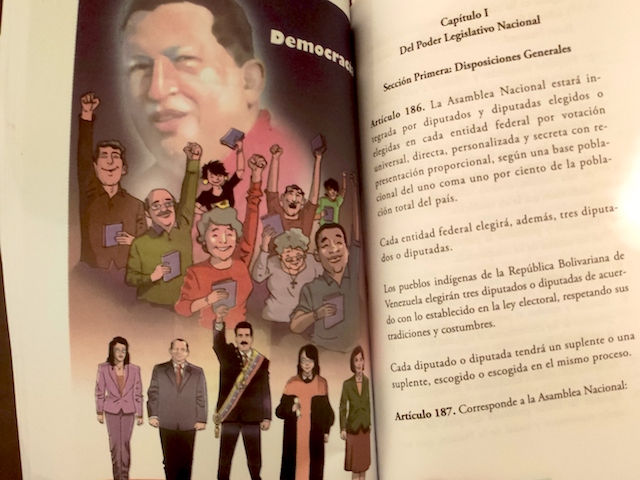
A copy of an illustrated children’s Venezuelan constitution featuring late dictator Hugo Chávez in the background and animated characters raising their fist in a gesture of socialist solidarity. Below, current dictator Nicolás Maduro appears also raising a fist. (Christian K. Caruzo/Breitbart News)
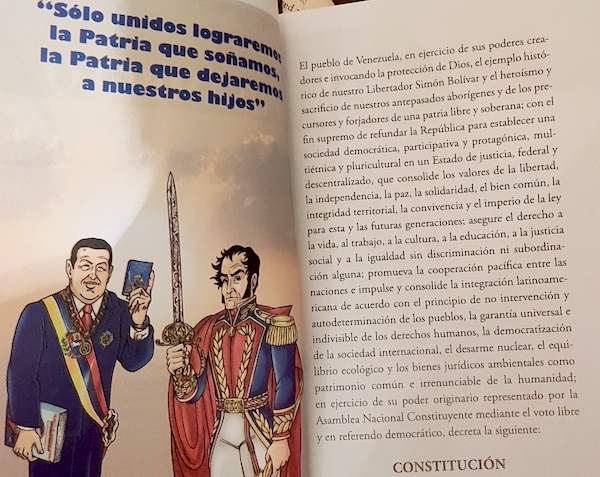
A copy of an illustrated children’s Venezuelan constitution featuring founding father Simón Bolívar and late dictator Hugo Chávez. The caption reads, “Only united can we achieve the Fatherland that we dream of, the Fatherland we will leave to our children.” (Christian K. Caruzo/Breitbart News)
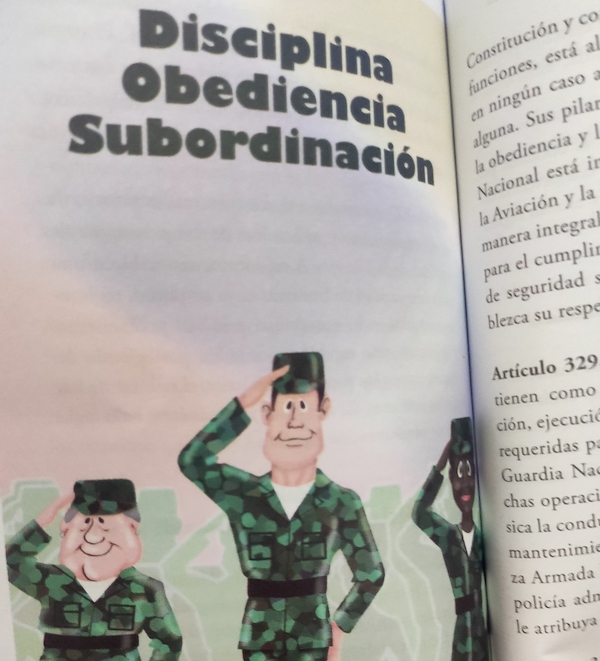
A copy of an illustrated children’s Venezuelan constitution featuring soldiers reading, “discipline, obedience, subordination.” (Christian K. Caruzo/Breitbart News)
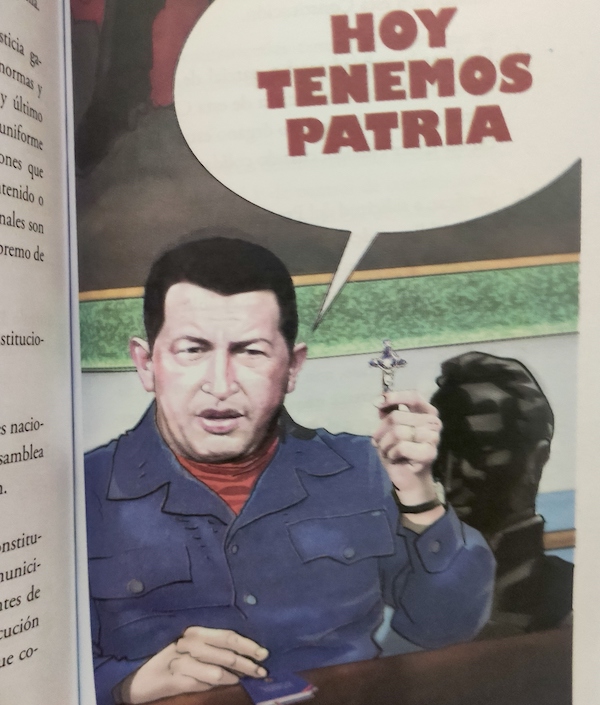
A copy of an illustrated children’s Venezuelan constitution featuring late dictator Hugo Chávez holding a cross. The caption reads “Today, we have a fatherland.” (Christian K. Caruzo/Breitbart News)
These social programs, of apparent noble intent, sought to eradicate illiteracy and provide remedial education to those that never studied or had dropped out at some point in their lives. In 2006, Chávez declared that these programs should guarantee their role as “promoting agents of the Bolivarian revolution.” By 2007, these programs began to experience high desertion rates, much to Chávez’s dismay.
Another, still ongoing pillar of the Revolution’s plans is the Bolivarian University, founded in 2003. The Revolution offers free education through this university, especially to the poorest in the country. It is free college education, yes, but it is extremely far-left ideologically loaded and in line with the Revolution’s socialist vision for both the country and the world.
The next big chapter in this tale occurred in October 2012, days after Chávez had won his third presidential term. The socialist regime introduced a new decree named Resolution 058 on October 16, 2012. Much like the 2000 decree, this resolution triggered everyone’s alarms, as authorities from the Education Ministry explicitly stated that the resolution was oriented towards “strengthening the socialism process” in Venezuela.
Chávez’s death in early 2013, the rise of socialist dictator Nicolás Maduro as his replacement, and the political tension and protests of that year, in a way, slowed down the regime’s ideologizing plans. But by 2014, they were ready to go full swing with their long game.
That year, the regime began mass distribution of the “Bicentennial Collection,” full-fledged sets of free educational books to students that cover first grade to high school. These books were commissioned from Cuba’s Castro regime, and completely and utterly destroyed the education curriculum with their Marxist and socialist ideals. The textbooks sought to rewrite history, portraying Hugo Chávez as a greater hero than Venezuelan independence hero Simón Bolívar, for whom the Bolivarian Revolution is named.
The math exercises in these books, instead of being the common ones you would see in regular text books, feature examples from the regime’s social programs.
While these books had been in circulation for some time, it was during 2014 when they began to be mass-produced and distributed. Parents vehemently rejected these books, some of whom proceeded to trash and burn them. In turn, the Maduro regime accused them of engaging in “Nazi” and “Pinochet-esque” practices.
Children began to receive “anti-imperialist” homework and assignments — for instance, having minors participate and carry out activities in protest of the Obama administration’s 2015 decree that declared Venezuela’s situation an “unusual and extraordinary threat to the national security and foreign policy of the United States.”
These books are still being distributed. If you’re curious, you can find free copies of the books on the internet, for example, of the high school series.
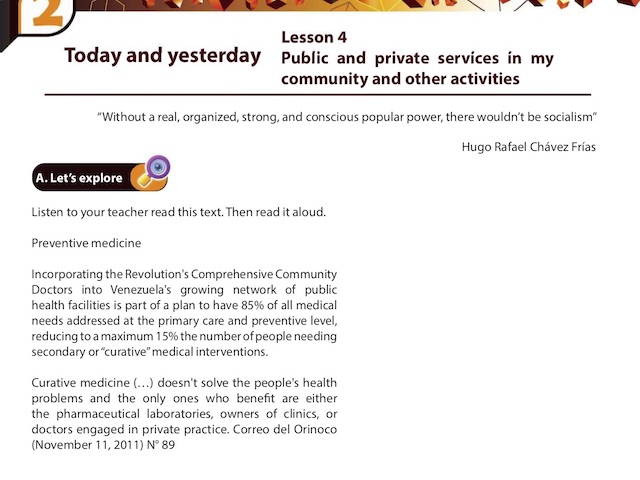
A fifth-year English high school textbook featuring quotes from Hugo Chávez and socialist healthcare project propaganda. (Informatics and Telematics Foundation (FUNDABIT), Government of Venezuela)

A page of a first-year English language textbook for high school. featuring Hugo Chávez and the socialist movement’s altered portrait of Simón Bolívar. (Informatics and Telematics Foundation (FUNDABIT), Government of Venezuela)
Regrettably, despite the valiant efforts and fierce resistance from parents, the regime’s indoctrination did manage to latch onto the young minds of some of the youngest students in the country — for example, this interview from 2015, where a young girl praises Hugo Chávez, saying that he “gave his life for us” as if he was some kind of messianic figure.
“Many people say that they are brainwashing us and that they are blindfolding us, and that is a lie, because we are chavistas, and on the contrary, they are not brainwashing us, they are waking it up,” the girl says to a state media reporter.
When asked what her goals for the future were, the girl responded by saying “When I grow up I want to be a teacher so that later I can tell the children and inform them of everything the president did and that the benefits are here.”
In 2019, teachers and academics still deemed them as a threat to the nation’s students, as these books are a conduit for socialist ideologization. The arrival of the Chinese coronavirus pandemic in 2020 brought education to a grinding halt and, in turn, all of the regime’s ideologization plans – at least for a time.
Classes in Venezuela have just officially been restored to “normalcy” as of October 2022. The new 2022-2023 school year began in Venezuela with a continuation of high cases of absent students, inadequate facilities, and severe deficits of teachers.
Now that schools are back to “normal” by Venezuelan standards, socialist dictator Nicolás Maduro has already expressed his intention to resume distribution of the controversial book series.
Maduro also announced a new line of school supplies that feature Súper Bigote (“Super Mustache”), his superhero alter ego created as a counter to American superheroes such as Spider-Man and Superman.
“If they have Superman, we have Super Mustache,” Maduro said, right after saying that his Superhero persona is a big “Fuck you to imperialism.”
Ideologization through education isn’t something that the socialist regime has limited itself to doing within Venezuelan borders. It has also, in some capacity, done it internationally.
Venezuela, through some of its diplomatic missions in other countries, runs a series of “Culture and Cooperation” centers, the majority of which are located in Latin American and Caribbean countries. In non-Spanish speaking countries, such as those in the Caribbean, free Spanish language courses are given to the local population in these centers as a cooperation and gesture of goodwill — sounds good, right?
When I briefly worked as local personnel in one such diplomatic mission between 2010 and 2013, I saw how, in addition to regular topics that you would find in any normal language course in the world, the Spanish language was being taught through specific courses centered around Hugo Chávez’s life and the socialist revolution’s initiatives and “achievements.”
Back home, in the case of my two youngest cousins, they were able to finally finish their high school education a few months ago after several obstacles and all of the delays and complications incurred by the coronavirus pandemic.
As of the time of writing this, they still haven’t received their high school diplomas. The reason? The higher-ups went on vacation, and upon returning they told them that the corresponding office had “no ink nor supplies” to print them, so they had to chip in with their own limited resources to “collaborate” with the purchasing of the materials. Hopefully, they finally get their hard-earned diplomas soon because they have been waiting almost all of 2022 for them.
The Maduro regime has also disrupted normal university operations in the country through the nation’s Supreme Court, which is stacked to the brim with pro-Maduro cronies. The Supreme Court has repeatedly overruled legitimate internal elections of university authorities and, in the case of the privately-ran Simon Bolivar University, imposed its own directive board upon the university in 2021.
Interestingly enough, a friend of mine recently conveyed to me how the foreign first-world “woke ideology” precepts have begun to trickle down from abroad upon the private university he currently attends. While it’s not as bad as in, say, an American college, and we have a million other actual problems to deal with that nullify and make us more resistant to woke stuff, it’s definitely there in private universities, and my friend has had to play pretend in more than one opportunity to not be fully ostracized from group activities, down to having to display his pronouns and whatnot.
I managed to avoid the slow but sure introduction of the regime’s socialist ideology in the school curriculum simply because I was born too early to go through it when it was at its peak, and also because of my mother’s sacrifices — who, despite our rather rough economic situation at the time, did everything in her power to keep us studying in private school, which are in a way more shielded from the regime’s ideologization. However, I had to skip a lot of school days because of the constant conflicts, clashes, strikes, and protests, which undoubtedly had a negative effect on my education throughout school days. Be that as it may, it’s nothing compared to how ruined education has become in this country.
After everything that has occured, the quality of education in Venezuela has significantly dropped. According to recent reports, students in Venezuela have severe deficiencies in many areas such as math, English, chemistry, physics, and spoken skills.
Now that the Maduro regime has effectively “won” against the “opposition” and is comfortably holding all branches of power in Venezuela, it remains to be seen if it will further push its socialist ideology in schools as part of their renewed efforts towards maintaining a socialist state in the country.
Christian K. Caruzo is a Venezuelan writer and documents life under socialism. You can follow him on Twitter here.
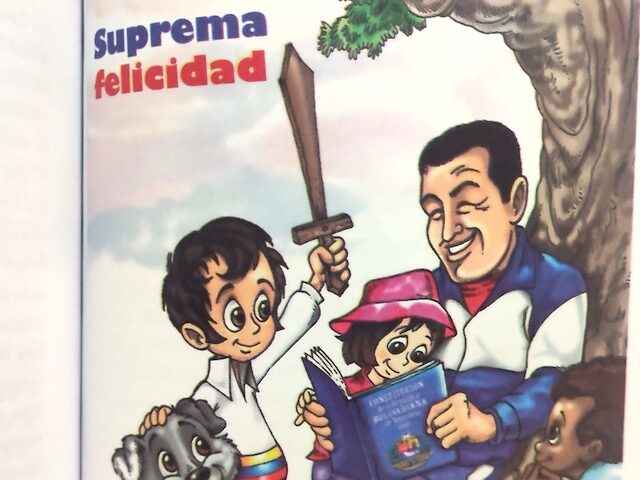
COMMENTS
Please let us know if you're having issues with commenting.